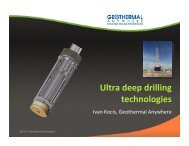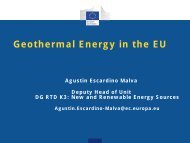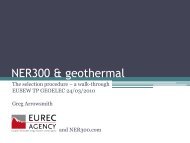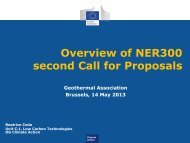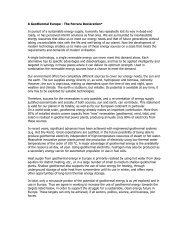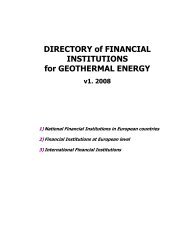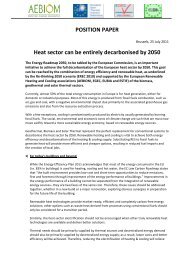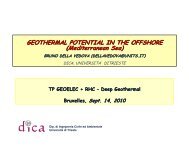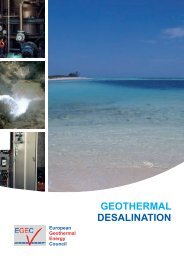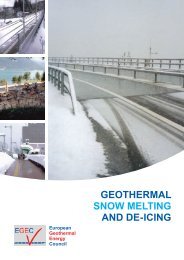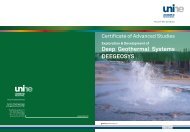Strategic Research and Innovation Agenda for Renewable ... - EGEC
Strategic Research and Innovation Agenda for Renewable ... - EGEC
Strategic Research and Innovation Agenda for Renewable ... - EGEC
Create successful ePaper yourself
Turn your PDF publications into a flip-book with our unique Google optimized e-Paper software.
<strong>Renewable</strong>Heating & CoolingEuropean Technology Plat<strong>for</strong>mSet up a Joint European <strong>Renewable</strong> Heating <strong>and</strong> Cooling programmeIn Europe, the strategic development of a research infrastructure <strong>for</strong> RHC is key <strong>for</strong>implementing the activities described in this RHC-SRA.The establishment of a “Joint European <strong>Renewable</strong> Heating <strong>and</strong> Cooling Programme” wouldallow the exploitation <strong>and</strong> valorisation of the competences existing in differentparts of Europe, bringing together a critical mass of research institutes <strong>and</strong> companiesactive in renewable energy technology, on storage, refrigeration, process heat etc.While infrastructures <strong>for</strong> R&D <strong>and</strong> testing should ideally be set up at European levelin the Joint Programme, a small number of <strong>Renewable</strong> Cooling Development Centres shouldalso be set up at national or regional level in high potential regions such as the Mediterraneanbasin <strong>and</strong> Southern Balkans.The RHC-Plat<strong>for</strong>m also recommends the establishment of a virtual or real “EuropeanInstitute <strong>for</strong> Thermal Energy Storage” composed of a broad research infrastructure,including testing equipment, which is necessary to meet the huge challenges of thisstrategically important technology. A wide exchange programme <strong>for</strong> master <strong>and</strong> PhDstudents within research institutes in all Member States should create the basis <strong>for</strong>a European-wide network of scientists working in this field.8.2 Education, training <strong>and</strong> certificationIn order to ensure the successful market deployment of RHC technologies, ef<strong>for</strong>tsare required to consolidate <strong>and</strong> harmonise certification, training <strong>and</strong> educationprogrammes at European level <strong>for</strong> practitioners, technicians, engineers <strong>and</strong> scientists. Suchprogrammes should be revised as advances in technology take place, <strong>and</strong> shouldbe founded on environmental sustainability. Training programmes in Europe need tobe increased significantly, not only at university level, but also on professional level.The potential of the labour <strong>for</strong>ce has to be deeply studied <strong>for</strong> the optimization of education,the requalification of employees <strong>and</strong> vocational training. The market deployment of RHCtechnologies will create dem<strong>and</strong> <strong>for</strong> experts <strong>and</strong> trained engineers <strong>for</strong> the manufacturing,installing <strong>and</strong> maintenance of the systems. The increasing imbalance between people retiring<strong>and</strong> the inflow of young people to the European labour market in general constitutes afuture challenge that could hinder the sector’s development. Without proper measures, thiswill cause a shortage of scientific <strong>and</strong> technical experts. Future needs in the fields of graduate,post-graduate, life-long, <strong>and</strong> professional training are assessed in the framework of theSET-Plan European Energy Education <strong>and</strong> Training Initiative recently launched by theEuropean Commission. This initiative covers 10 energy related sectors with the objective todeliver the quantity <strong>and</strong> quality of human resources required <strong>for</strong> the achievement of theambitious European climate <strong>and</strong> energy targets <strong>for</strong> 2020. Thereby, suitable integration ofRHC in graduate, post-graduate, life-long, <strong>and</strong> professional training shall be ensured atEuropean level.Professional training must respond to the needs of the heating <strong>and</strong> cooling industry.For the geothermal sector, training programmes are not comparable or compatibleacross Europe <strong>and</strong> are not adapted to the sector’s requirements in terms of content, mainlybecause of the lack of specific materials <strong>and</strong> regulations. The adaptation ofprofessional profiles to the requirements of the RHC sector <strong>and</strong> particularly to thoseof European legislation (EU 2009b) should address:• Setting up a stable structure to enable the transfer of geothermal technology <strong>and</strong>know-how from international (scientific) sources.• Producing a h<strong>and</strong>book of professional competencies or strategic professionalqualifications, including a list of the necessary profiles required by the geothermal sector.• Updating the existing technical guides <strong>and</strong> Codes of Best Practices, using as a basis Europeanbenchmarks to be adapted to the inherent characteristics of each country.• Fostering piloting training initiatives geared at drillers <strong>and</strong> equipment installers based onprevious European project models.79



